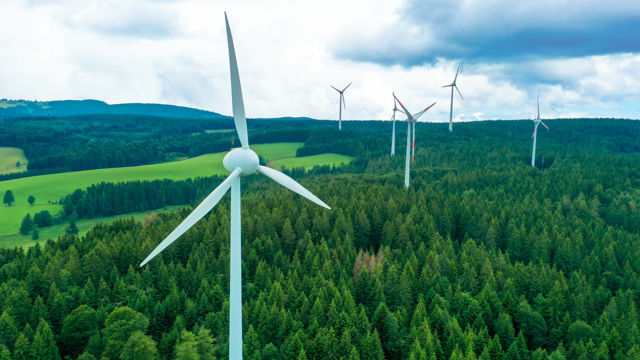Four common barriers to achieving sustainable manufacturing


How technology can help achieve sustainable manufacturing goals
As net-zero deadlines loom, manufacturers across the world are struggling to accelerate their company's sustainability journey.

Digitisation and automation pave the way for sustainable manufacturing
As we cast our gaze toward the year 2050, the global manufacturing landscape unfolds with a captivating vision of sustainable manufacturing and resilience. The manufacturing sector is undergoing profound metamorphosis, adapting to emerging technologies, environmental imperatives, and evolving consumer expectations. By 2050, manufacturing will play a pivotal role in shaping a sustainable and resilient global future. This transformation will be fueled by technological innovations, circular economy practices, renewable energy adoption, supply chain diversification, skill development, policy advocacy, and dynamic business environments.
Globally, manufacturers are responsible for consuming 54% of the world’s energy resources and one-fifth of carbon emissions. Reaching net zero by 2050 requires manufacturers to rethink their entire ecosystem to decarbonize and do more with less, all while growing their bottom line. It is now critical to set commitments, develop a strategy, and build an operational roadmap - all while measuring progress and ensuring accountability. We are at the dawn of a new revolution, the manufacturing sustainability revolution. Unlike any other eras that evolved at their own pace, manufacturers are working under an urgent deadline constrained by the laws of nature.
The sustainable trajectory for manufacturing is intricately linked to technological progress. The advent of artificial intelligence, big data, and the Internet of Things (IoT) heralds a new era in manufacturing production processes. Their convergence holds immense potential to enhance efficiency while minimizing waste—a critical stride toward embracing sustainable manufacturing. By harnessing these digital tools, manufacturers can optimize resource utilization and significantly reduce their environmental impact. This path, where advanced technologies seamlessly integrate with traditional manufacturing practices, lays the groundwork for a revolutionized and sustainable manufacturing sector.
If the world is going to meet net-zero goals by 2050, manufacturers need to use their entire ecosystem and all of their positions of influence.
UK Manufacturing Outlook: Envisioning the Future of Manufacturing in 2050
By 2050, manufacturing will be a vital part of the UK's sustainable and resilient future, driven by technology, circular economy practices, renewable energy, supply chain diversification, skills development, policy support, and changing business environments.
Four common barriers to achieving sustainable manufacturing
Sustainable manufacturing encompasses a broad range of terms and concepts, several of which are often mistakenly used interchangeably. Being carbon neutral is not the same as reaching net zero.
While sustainability targets remain a priority, and companies are better grasping the cost-saving as well as planet-saving benefits, the reality is that going green can quickly become expensive.
The pace at which sustainability initiatives are moving makes it hard to know exactly what skills, knowledge and competencies will be needed. However, they will likely span five key domains.
Most manufacturers already measure their direct energy usage and fuel consumption, but accounting for indirect value chain emissions remains challenging. Automating manual processes enables companies to easily record, report and understand their environmental impact. Read more.
Sustainable manufacturing operations are critical and gaining momentum
54%
is from manufacturing
19%
are used by industry & energy
31%
in their supply chains
Microsoft Cloud for Sustainability
In January 2022 Microsoft launched a Microsoft Cloud for Sustainability. Here's what they said:
"We launched Microsoft Cloud for Sustainability in June 2022 with a commitment to help our customers create their own operational efficiencies to reduce their environmental impact. We have made amazing progress since we launched, releasing new features every month. With Microsoft Cloud for Sustainability, we have enabled organizations to accelerate sustainability progress and business growth by bringing together environmental, social, and governance (ESG) capabilities from Microsoft and our global ecosystem of partners."
- Introducing the latest ESG innovations with Microsoft Cloud for Sustainability, Microsoft
Microsoft Dynamics Matters Podcast Series
Michael Lonnon chats with Marie Wells & Clare Brown, Sustainability Experts from The Manufacturing Technology Centre & Microsoft
Keep reading
Learn more about sustainable manufacturing here
Complete the form below to find out how HSO can help you.
How can we help you?
Dive into our knowledge

With special guest Neil Duffy, Commercial and Services Director, Retail Trust ✔ 190 years of protecting the lives of people working in retail ✔ Why mental health was the biggest challenge during the Pandemic ✔ How technology helps support retailers
While many acknowledge the drivers for sustainable transformation, the efforts of companies are being undermined by a number of common barriers.

With special guest Marie Wells, Head of Sustainability, MTC ✔ How to create a sustainable organisation ✔ How to measure how sustainable your organisation is ✔ Top tips for maintaining your sustainable approach

With special guest Clare Brown, Director of Manufacturing Energy and Resources, Microsoft ✔ How to take a sustainable approach to manufacturing ✔ What your sustainable transformation journey looks like ✔ How to build your sustainability business case
By optimising processes, increasing visibility and enhancing collaboration, cloud computing can help manufacturers reduce their environmental impact while improving operational efficiency.
Microsoft Cloud for Sustainability is helping manufacturers take control of their environmental initiatives and fast-track progress to a more sustainable future.




